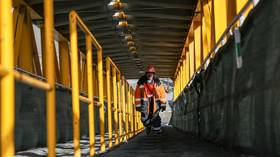Ex-Russian president dunks on ‘stupid’ EU move

Former Russian President Dmitry Medvedev has expressed skepticism about the EU’s move to impose a cap on spot gas prices. It indicates that European energy prices will remain high for the foreseeable future, he said.
“The decision on a gas-price cap is stupid,” the top official, who currently serves as deputy chair of the Russian National Security Council, said in a social media post on Friday.
Medvedev believes that the EU attempt to “correct” the market is inherently flawed because at its core it is based on “the maniacal talking point that ‘Russians are to blame for everything’,” and that the EU will find it difficult to enforce.
“It was taken because the EU has no power to influence the situation,” he argued. “Simply for the sake of ‘doing something’.”
The global energy market became turbulent due to the Covid-19 pandemic then the crisis in Ukraine. The Russian official noted that the cap level chosen by the EU would have seemed unbelievably high just a couple of years ago.
“It means that gas prices will remain at a quite high level for European consumers,” Medvedev concluded.
EU energy ministers agreed on Monday to place an emergency price cap on wholesale gas purchases at €180 ($191) per megawatt-hour (MWh). It would be triggered by gas futures being traded at a higher level for three days at the Dutch TTF.
Supporters of the mechanism claim it is needed to prevent spikes similar to what the EU experienced in the summer, when the prices reached as high as €300/MWh. Skeptics argue that the EU may face shortages, since suppliers of liquefied natural gas (LNG) would switch shipments to Asian markets, where no such limitation exists.
Energy prices in Europe surged last year as economic recovery in Asia pushed up global demand for the fuel. This year the situation worsened for the continent, as the EU imposed economic sanctions against its primary gas supplier Russia in retaliation for sending troops into Ukraine.
EU members have tried to compensate for the loss of Russian pipeline gas by ramping up purchases of LNG, primarily from the US. The product is significantly more expensive and requires rapid expansion of European infrastructure to be delivered in high volumes. European governments are trying to soften the blow on consumers with subsidies and programs to cut energy consumption.













